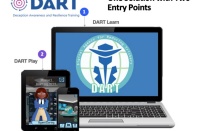A Bigger Picture of Secure Multi-Party Computation
Dr. Blanton presented A Bigger Picture of Secure Multi-Party Computation for the Cryptography, Security, and Privacy (CrySP) Speaker Series.
Presentation Abstract
Secure multi-party computation is a mature sub-area of cryptography that enables computation over private data. Products utilizing such techniques are now increasingly being built by tech companies for privacy-preserving data analytics and other purposes.
For many years, progress in this area has focused on mechanisms for securely performing different operations, i.e., on how to perform secure function evaluation. Dr. Blanton argues that other aspects of privacy-preserving computation deserve the attention of the research community. They include ensuring the trustworthiness of inputs to the computation, achieving security of linked computations, and selecting functions to ensure that the (authorized) information disclosure from the output is limited.
She investigates the last component in more detail on the example of average salary computation, inspired by the Boston privacy-preserving gender gap study carried out in 2015-2017.
Meet Dr. Blanton
Marina Blanton, is Associate Professor in the Department of Computer Science and Engineering, and also serves as the Faculty Director of Women in Science and Engineering (WiSE) program at UB.

She received her PhD and MS in Computer Science from Purdue University and MS in Electrical Engineering and Computer Science from Ohio University.
Dr. Blanton's research interests focus on information security, privacy, and applied cryptography. Recent projects span across areas such as secure computation and outsourcing, integrity of outsourced computation and storage, private biometric and genomic computation, authentication, and anonymity.
She has over 80 refereed publications, has served on the technical program committees of top conferences such as USENIX Security, IEEE S&P, and CCS, and is currently an associate editor of IEEE Transactions on Dependable and Secure Computing. She has received multiple awards for her research, including a 2013 AFOSR Young Investigator Award, the 2015 ACM CCS Test of Time Award, and a 2018 Google Faculty Research Award.



